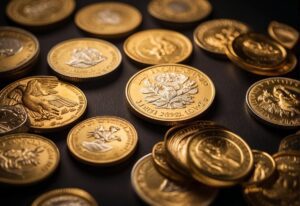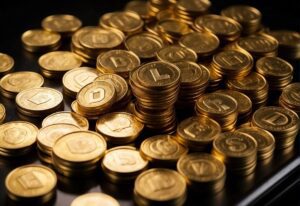Investors seeking a diversified retirement portfolio often consider cryptocurrency IRA accounts vs gold IRA accounts as alternative asset classes. A Cryptocurrency IRA Account allows individuals to include digital currencies like Bitcoin and Ethereum in a self-directed IRA. These IRAs are a modern investment tool for those who believe in the transformative potential of blockchain technology and digital assets.
On the other hand, a Gold IRA Account is also a self-directed IRA, enabling the inclusion of precious metals in one’s retirement account.
Gold has long been valued for its stability and hedging capabilities against inflation and economic uncertainty. Gold IRAs offer a compelling option for investors looking to safeguard their retirement savings with a time-tested asset.
Given their distinctive features, investors must understand the risks and opportunities presented by cryptocurrency and gold IRAs.
Considering market volatility, historical performance, security, and regulations will help investors make informed decisions in aligning their retirement goals with the right type of self-directed IRA.
Understanding IRA Accounts
Individual Retirement Accounts (IRAs) are critical financial tools that offer tax advantages to individuals saving for retirement. They cater to various retirement strategies and economic situations, differing in tax implications, contribution limits, and investment options.
Types of IRA Accounts
There are several types of IRAs, each designed with specific features to cater to the diverse needs of retirees.
- Traditional IRA: Funds are put in pre-tax, and taxes are paid upon withdrawal.
- Roth IRA: Contributions are made with after-tax dollars, offering tax-free withdrawals in retirement.
- SEP IRA: A Simplified Employee Pension plan allows employers and self-employed individuals to make pre-tax contributions.
- SIMPLE IRA: A Savings Incentive Match Plan for Employees that enables both employer and employee contributions with tax benefits.
- Self-directed IRA (SDIRA) offers greater investment flexibility in real estate, precious metals, and cryptocurrencies.
What Is a Self-Directed IRA?
A Self-Directed IRA is unique among IRAs for its capacity to invest in alternative assets. A custodian or trustee administers it and provides the account holder with:
- It extended investment options beyond stocks and bonds to include tangible assets, private market securities, and digital assets like a crypto IRA.
- More control over their investment decisions is ideal for investors with expertise in specific asset classes.
Tax Advantages of IRA Accounts
IRAs are celebrated for their tax-advantaged nature, offering potential deductions on income taxes and favorable treatment of capital gains tax. Key tax benefits include:
- Traditional and SEP IRAs: Allow tax-deferred growth with the possibility of tax-deductible contributions.
- Roth IRAs: Provide tax-free growth and tax-free withdrawals in retirement, provided certain conditions are met.
- 401(k) Rollovers: A 401(k) account can be rolled into an IRA account, often without incurring immediate taxes.
Each IRA type is regulated with distinct qualifications, contribution limits, and rules regarding withdrawals and rollovers. Individuals must understand the nuances of each to plan effectively for their retirement.
Cryptocurrency in IRAs
Investing in a Cryptocurrency IRA allows individuals to include digital assets such as Bitcoin and Ethereum in their retirement portfolios, offering a high potential for diversification amidst the volatility inherent in digital currencies.
Benefits of a Cryptocurrency IRA
Diversification: Adding cryptocurrencies to an IRA can introduce a diversification element to a retirement portfolio, potentially balancing exposure to traditional asset volatility.
Potential for Growth: The dynamic growth of digital assets, particularly Bitcoin IRA and Ethereum IRA, may offer substantial upside potential despite the associated risks due to market volatility.
How Does a Cryptocurrency IRA Work?
A Cryptocurrency IRA works similarly to a traditional IRA, allowing the account holder to invest in digital currencies. As self-directed IRAs, these accounts allow investors to explore cryptocurrency markets through an exchange.
Crypto IRA Custodians and Security
Custodians: Reliable and secure custody is a critical aspect of a cryptocurrency IRA. Custodians, such as Coinbase, are responsible for safeguarding digital assets.
Security Measures: Segregated cold storage and insurance are best practices for protecting investors’ assets against theft and hacking.
- Custody Services: They may offer storage and security services, ensuring the crypto IRA meets regulatory standards.
- Insurance: Leading custodians provide insurance policies to protect the investor’s portfolio.
Gold in IRAs
Investing in a Gold IRA allows individuals to hold physical gold and other precious metals in their retirement account, offering a unique form of asset diversification. This section explores the benefits of including gold in the retirement portfolio and how it functions within an IRA structure.
Benefits of a Gold IRA
A Gold IRA offers diversification from the typical stocks and bonds, as precious metals tend to move independently of market conditions, providing a hedge against inflation and price volatility.
Investors find comfort in gold’s historical durability as an asset, viewing it as a layer of security for their retirement savings.
- Tax Advantages: Similar to traditional IRAs, Gold IRAs offer tax benefits, allowing the potential for tax-deferred growth.
- Perceived Stability: In uncertain economic times, gold is often seen as a stable investment.
- Diversification: Reduces the potential risk, as gold correlates negatively with stocks and bonds.

Get Matched With A Vetted
GOLD IRA ADVISOR TODAY
How Does a Gold IRA Work?
Opening a Gold IRA requires an investor to establish a self-directed IRA with a custodian authorized to hold physical precious metals. The process includes:
- Choosing a Custodian: Investors must select a custodian, often a specialized firm, that understands the complexities of holding precious metals.
- Funding the IRA: The IRA can be financed by a rollover or transfer from existing retirement accounts or through cash contributions.
- Purchasing Metals: Investors then select the gold or other precious metals to be purchased. These must meet IRS standards for purity.
- Storage Solution: The purchased metals are stored in a secure, IRS-approved facility. The custodian manages the storage solution to ensure security.
- Maintenance Fees: Investors should know the potential maintenance fees for managing and storing the metals.
Investors should also note that while Gold IRAs can provide security and diversification, there is always an element of risk, as with any investment, and prices for gold and other precious metals can be volatile.
Comparing Cryptocurrency and Gold IRAs
When considering a retirement account, investors weigh the balance between growth potential and stability. Cryptocurrency IRAs offer high growth potential amid significant volatility, while Gold IRAs are typically seen as safe-haven assets during economic downturns.
Risk and Volatility
Cryptocurrency IRAs are noted for their price volatility, with the possibility of high returns accompanied by substantial risk.
Investors in cryptocurrency IRAs should be prepared for the risk of rapidly changing market prices.
Conversely, Gold IRAs generally provide a more stable investment with less price volatility, making them a traditional hedge against inflation and market instability.
Fees and Expenses
Investors should carefully evaluate the fees associated with both Cryptocurrency and Gold IRAs.
Due to the dynamic nature of the cryptocurrency market, cryptocurrency IRAs may incur maintenance fees, transaction fees, and perhaps higher trading fees.
In comparison, Gold IRAs often have account fees and potential storage solutions costs that can affect the overall investment expenses.
Regulations and Security
Security and regulations are paramount when it comes to retirement accounts.
Cryptocurrency IRAs must comply with IRS rules, including using approved custodial services.
Regulations surrounding these accounts are evolving as cryptocurrencies become more mainstream.
Gold IRAs are well-established regarding security practices and regulations, with clear IRS rules regarding storing and custody of physical assets.
Investment Considerations for IRA Accounts
Evaluating Individual Retirement Accounts (IRAs) requires carefully considering asset types, associated risks, and tax implications, which is critical for a well-balanced retirement strategy.
Diversifying Retirement Portfolios
Diversification stands as a fundamental strategy for mitigating risk in retirement portfolios.
It involves spreading investments across asset classes such as stocks, bonds, mutual funds, and alternative assets like cryptocurrency and gold.
A diverse portfolio may help investors shield their retirement savings from volatile markets, as the performance of different assets can vary independently.
Understanding Capital Gains in IRAs
Within an IRA, recognizing the impact of capital gains taxes is essential.
Traditional IRA investments grow tax-deferred, meaning capital gains and dividends are not taxed until withdrawal.
Conversely, if conditions are met, Roth IRAs offer tax-free growth, allowing withdrawal without incurring capital gains taxes.
However, losses within IRAs cannot be deducted as they can be in non-IRA investments.
Expertise and Financial Advice
Navigating IRA investments requires some level of experience and expertise.
Investors often benefit from consulting financial advisors to make informed decisions.
Advisors can provide insights into the risks and returns of various assets, including how stocks, bonds, and mutual funds align with an individual’s retirement goals.
They also offer valuable guidance on alternative assets, which can have different risk profiles than traditional investments.
How to Start a Cryptocurrency or Gold IRA
Starting a Cryptocurrency or Gold IRA involves selecting a trustworthy custodian, funding the account appropriately, acquiring eligible assets, and understanding the specific rules for contributions and withdrawals. The process is entirely systematic and requires adherence to IRS guidelines for alternative investments.
Choosing the Right Custodian
Selecting the proper custodian when opening a Cryptocurrency or Gold IRA is crucial. A custodian is an IRS-approved financial institution responsible for ensuring that the IRA meets all regulatory requirements.
For Cryptocurrency IRAs, specialized custodians like BitIRA, Equity Trust, and iTrustCapital are equipped to handle unique assets such as Bitcoin Cash, Litecoin, Cardano, and other digital currencies.
For Gold IRAs, one should look for custodians experienced in dealing with precious metals and real estate investments.
Ensure that the custodian offers a robust platform for crypto trading and secure storage options for gold or other property.
The IRA Funding Process
Funding your IRA typically begins with deciding whether to transfer or roll over money from an existing retirement account or make a fresh contribution from a savings account.
The source, such as a SEP IRA set up by an employer or an existing retirement account, will have specific rules about transferring funds.
Investors should make an informed decision about the minimum investment and whether their chosen custodian requires account minimums.
Purchasing Assets and Managing the Account
Once funded, the investor is ready to purchase assets. A cryptocurrency IRA generally involves holding cryptocurrencies such as Bitcoin Cash, Litecoin, or Cardano.
For a Gold IRA, this could involve investing in physical gold or other IRS-approved precious metals.
Maintaining diversity within the account is vital to mitigate risks and leverage potential growth opportunities in traditional assets like real estate and alternative investments like digital currencies.
IRA Contribution and Withdrawal Rules
The IRS sets contribution limits for IRAs annually, and understanding them is essential for maintaining the account’s tax advantages.
Traditional and Roth options have different implications for tax deferral and withdrawals for Cryptocurrency and Gold IRAs.
Generally, withdrawals from a Traditional IRA are taxed as income, whereas eligible distributions from a Roth account are tax-free.
Planning your IRA rollover or contributions with these rules in mind will help maximize the potential growth of your retirement savings.
Selecting Cryptocurrencies and Precious Metals
Investors must evaluate which assets best fit their investment goals and risk tolerance when considering an Individual Retirement Account (IRA) that includes cryptocurrencies or precious metals.
Popular Cryptocurrencies for IRAs
Cryptocurrency trading through an IRA can provide a tax-advantaged way to invest in digital assets.
Bitcoin and Ethereum are among the most popular due to their established market presence and widespread acceptance.
Other noteworthy cryptocurrencies often selected for coin IRA portfolios include Ripple (XRP), known for its fast transaction network; Ethereum Classic, which maintains the original Ethereum blockchain; Cardano (ADA), favored for its strong focus on security and sustainability, and Polkadot (DOT), which enables cross-blockchain transfers for a variety of blockchains.
- Bitcoin (BTC)
- Ethereum (ETH)
- Ripple (XRP)
- Ethereum Classic (ETC)
- Cardano (ADA)
- Polkadot (DOT)
These assets hold popularity for their potential growth and innovative technology in the crypto space.
Gold and Other Precious Metals
Precious metals like gold, silver, and platinum are often included in IRAs as they are historically seen as stable stores of value.
Gold is the most commonly held precious metal in an IRA because it can hedge against inflation and economic uncertainty.
Silver presents a more affordable entry point for investors and offers industrial demand.
Platinum, while less common, is valued for its rarity and use across various industrial applications.
- Gold (Au)
- Silver (Ag)
- Platinum (Pt)
These metals can serve as a diversifying asset in an investor’s retirement portfolio due to their historical resilience in contrast to market volatility.
Cryptocurrency and Gold IRA Providers
In the rapidly evolving landscape of retirement investments, individuals can choose between cutting-edge cryptocurrency IRAs and more traditional Gold IRAs. Diverse providers offer specialized accounts that cater to different investment strategies and preferences.
Profiles of Leading Providers
CoinIRA specializes in cryptocurrency IRAs, offering investors a gateway to a new era of digital retirement investments with a focus on security. Clients can access various cryptocurrencies, including Bitcoin, to diversify their retirement portfolio.
Equity Trust is a custodian for cryptocurrency and Gold IRAs, ensuring that over $320 million in customer assets are securely managed. As a trusted name in alternative asset IRAs, Equity Trust offers clients peace of mind with a solid track record.
Alto IRA is known for its expansive investment selection, allowing traditional IRA, Roth IRA, and SEP IRA holders to explore Bitcoin, Ethereum, and over 150 other cryptocurrencies.
Broad Financial permits private and direct control of IRA funds with their self-directed accounts, including a Solo 401(k) option, which is attractive for self-employed individuals seeking autonomy.
Comparing Provider Options and Features
| Provider | Account Type | Investment Options | Custody and Security |
|---|---|---|---|
| CoinIRA | Cryptocurrency IRA | Bitcoin, Ethereum, and others | Secured in cold storage |
| Equity Trust | Cryptocurrency and Gold IRA | Cryptos, Precious Metals | Custodian provides security |
| Alto IRA | Cryptocurrency IRA | Over 150 cryptocurrencies | Partners with Coinbase for storage |
| Broad Financial | Solo 401(k), IRA | Cryptos, Gold | It gives investors checkbook control |
Coinbase, renowned for its platform user-friendly platform, collaborates with providers like Alto IRA to offer robust security measures for digital currency investments. Meanwhile, Rocket Dollar provides a streamlined approach to setting up a self-directed Solo 401(k) or IRA for investing in both asset classes.
The Future of Investments in Retirement Accounts
Investments in retirement accounts are continually evolving, propelled by demand for diverse assets and shifts in investor behavior. Two noteworthy instruments, cryptocurrency and gold IRAs, are frontiers in this domain, challenging traditional investment paradigms.
Trends in Cryptocurrency and Gold Investing
Cryptocurrency IRAs have surged due to bullish market trends and growing institutional acceptance. Providers are now weaving crypto into retirement plans, offering products like Bitcoin IRAs.
These IRAs operate like traditional self-directed IRAs, conferring the same tax advantages while allowing investment in Bitcoin and other cryptocurrencies.
This rise parallels a broader trend: Fidelity Investments, for instance, has begun incorporating Bitcoin into 401(k) plans, suggesting a potential shift towards mainstream crypto adoption in financial planning.
In parallel, gold IRAs continue to represent stability. Precious metals garner appeal during economic fluctuations, hedging against inflation and market volatility.
Startups and established financial institutions facilitate the inclusion of gold into retirement portfolios, bolstering the asset’s reputation as a haven.
Predictions for Retirement Investment Strategies
Market analysis and forecasts anticipate increasingly individualized retirement strategies, emphasizing portfolios that blend traditional and alternative assets.
Cryptocurrency IRAs might become standard offerings, provided regulatory developments favor such inclusion.
Expanding crypto IRAs could reshape retirement investment strategies as more investors become comfortable with digital assets.
While less volatile, gold is anticipated to remain a diversifier.
Effective financial planning for retirement will likely continue to involve gold as a counterbalance to more speculative assets like Bitcoin.
The future of retirement investments seems poised on a frontier where the old meets the new as investors seek both innovation and assurance in their retirement accounts.

Get Matched With A Vetted
GOLD IRA ADVISOR TODAY
Frequently Asked Questions
In this section, investors can find precise answers to common queries about the distinct features and considerations of Cryptocurrency IRAs and Gold IRAs.
What are the key differences between a Cryptocurrency IRA and a Gold IRA?
A Cryptocurrency IRA allows investors to hold digital currencies like Bitcoin, whereas a Gold IRA focuses on physical or gold-related assets.
Cryptocurrency IRAs often expose a rapidly changing market, while Gold IRAs offer a more traditional, stable investment historically associated with wealth preservation.
How do fees typically compare between Cryptocurrency IRAs and Gold IRAs?
The fees for Cryptocurrency IRAs can vary significantly and may include trading fees and security costs.
Gold IRAs also incur seller’s costs, storage fees, and insurance.
Typically, Cryptocurrency IRA fees are associated with the custodian’s services and the security of the digital assets, while Gold IRA fees are connected to physical storage and insurance.
What should investors consider when choosing between a crypto-based IRA and a gold-based IRA?
Investors should assess their risk tolerance, investment objectives, and views on the future of digital currencies compared to traditional assets like physical gold.
Market volatility, security of the investments, and potential for long-term growth are crucial considerations.
How does the potential for growth in a Cryptocurrency IRA compare to that of a Gold IRA?
Cryptocurrency IRAs have shown the potential for high growth, reflecting the volatile and sometimes rapidly appreciating nature of digital currencies.
In contrast, Gold IRAs exhibit less volatility and may provide steady growth, leveraging gold’s historical role as a safe-haven asset.
What are the tax implications of investing in a Cryptocurrency IRA versus a Gold IRA?
Cryptocurrency and Gold IRAs typically offer similar tax-advantaged growth, with potential tax deferral until distributions are taken.
It is essential to consult with a tax professional to understand the specific implications of one’s circumstances.
Can a self-directed IRA include both cryptocurrencies and gold and what are the benefits?
Yes, a self-directed IRA can include both cryptocurrencies and gold.
Diversifying with both assets could potentially balance cryptocurrencies’ high-risk, high-reward nature with the relative stability of gold, offering a blended risk profile.





